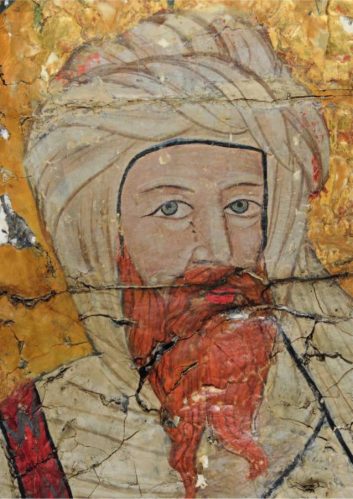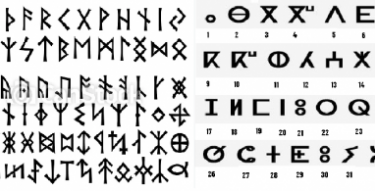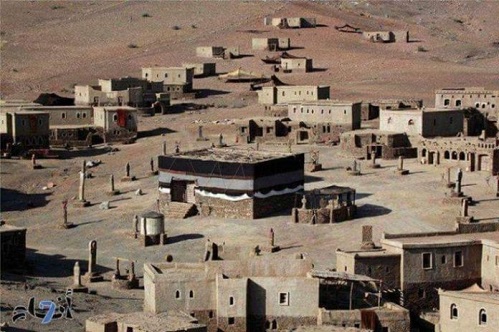On the subject of the Punic language, here is the answer given by Saint Augustine, the African, when in 390, the grammarian Maxime of Madaure, also African, wrote to him, making fun of the names of saints and martyrs venerated by Christians, Saint Augustine answers him, not without pride: “… As for these Punic names of characters who are no longer, names that you have collected to take the subject of launching your outrageous sarcasm against our religion, I do not know whether I should refute or pass over such madness in silence … You would have to have forgotten that you are African, writing to an African and that both of us live in Africa, to believe that the strangeness of a few Punic names is worth to be raised. Moreover, by interpreting the meaning of these names one will find that Namphanion signifies a man who comes from a favorable footing, that is to say, a man whose arrival brings good luck …If it is the Punic language that you dislike, then deny, despite the assertion of the most learned men that this language has left in memory a host of excellent things. Regret having been born here, on this land, the cradle of this language …” Letter 17 in “Complete Works of St Augustine, Bishop of Hippo”.
The Phoenician myth
There is no absolute objectivity in the field of history. Historians show us reality from a precise angle, as broad as possible, while being aware that their lens is limited. In short, without questioning their convictions, historians are naturally prepared to admit that the writing of history is never complete. The work is never quite finished. New archaeological discoveries which are grafted onto a solid base of knowledge, the fruit of the work of hundreds of historians over a vast period of time.
And yet this serene assurance is far from reflecting any fidelity to historical truth. Let us take a well-known example, that of the “Phoenicians” of the “Carthaginian” civilization.
“Phoenician Studies” is an academic department where many university theses are written, which are a priori serious and substantiated. Nevertheless, these “Phoenician Studies” are rather problematic: The very term “Phenicia”, its origin, its etymology and its meaning, are themselves subject to controversy.
Where does this name of Phenicia come from which has now become a general and indisputable consensus – unanimously adopted by scientific historiographers, and even, to the point of absurdity, by the North African populations, in whom exists almost all the vestiges of this period!
And the “Phoenicians” themselves? Were they called “Phoenicians”? Colonizing traders, this is the immediate association that comes to mind when one hears ‘Phoenicians’. And one wonders whether the Phoenicians are in fact only fiction, pure literature inspired by Homer’s works, or a term originating at the end of the Middle Ages when the Europeans seized the technique of printing to denature and orientalize the history of North African.
In recent times a good part of the specialists who have researched and written on the Phoenicians have carefully taken pains to qualify the existence, in antiquity, of a people bearing this name, but no one has yet dared to clearly state that the “Phoenicians” never existed outside the imaginations of a few French scribes, in the first place Samuel Bochart, Ernest Renan and Serge Lancel .
However, the reality that archaeologists and historians have been facing for several decades now is the following: There has never been a country called “Phenicia”, in any case not on the shores of the Mediterranean, eastern or western. We do not know of any king who bore the title of “king of the Phoenicians”, nor any official who collected taxes for any “Phenicia”; in the tablets, we do not see names of any trader, craftsman, potter or goldsmith declaring himself “Phoenician” or claiming to come from “Phenicia”; no grave was found mentioning “such and such, Phoenician”; nor have we found any letters or embassies relating to a country which bore that name.
Scholars claim that the “Phoenicians” were “a people without a state, without territory and without political unity” (in other words, they were not a people!) – that “they did not constitute a nation with a central authority and that they did not pursue a unitary policy either”, even if they did share common traditions and certain parts of the territory.
If the “Phoenicians” never existed, if there is not, on the entire Syrian coast, where they are said to come from, a single archaeological or documentary reference on them, then why are they featured in all history books? Why do we continue to use the word “Phoenicians”?
The idea of the existence of the Phoenicians turned out to be a perfect mask to conceal a series of crimes the victims of which were the civilized peoples of North Africa, heirs to the Pharaonic civilizations, Garamantes and of the now extinct Atlantis mentioned by tablets of the pharaohs and Greek historians. It is time for the North Africans to stop acting as megaphones amplifying a hoax story crafted to undermine them, and write their own history.
In Search of the Phoenicians
The Phoenicians, or the history of distorted and orientalized North Africa
Who were the ancient Phoenicians, and did they actually exist?
by






Very interesting article even if it leaves it to others to accomplish the finality. Until now, North Africans blindly trust French pseudo historians as if they are not at the service of their nation.
Phoenician never existed, it is a recent appellation of the manipulators of orientalist history. All heritage of the North African Atlanteans and their descendants is made oriental “Arab, Jewish” with each a region because they have no real existential civilization, proven, indisputable like the North Africans.
If the Phoenician existed that we are provided with archaeological, scientific or linguistic evidence because the Phoenicians who are not a people but marans who spoke the Punic language north African. It is a usurpation for an imaginary oriental construction. Soon with the new rewriting of yet another puppet, with the new orientalist historians after having withdrawn Egypt from its North African cradle are in the process of making the Orient the first civilizers of humanity while African man has marked the history by accepting Lonitan evidence in different places. And that the whole Asian space is her creation.
The story makes believe that the Phoenicians with the joke of the story of DIDON (sidon) the cunning, that she brought her civilization. In all logic, the Carthaginians, if this were the case, should speak Phoenician and not the thousand-year-old language, North African Punic. TAFNIQT.
The ruse which consists in saying the Phoenician is a dead language which has disappeared do not you know.
It simply does not exist. The Western orientalists at the origin of the creation of the East, want to reverse the civilizational attributes of the continents to make the East the first because they want to erase the original from which they came and in particular to make hum all the luminous past of Africa which civilized them to become its worst enemies. Now Africans are kept in a state of powerlessness after having been vandaised, looted and expropriated of their heritage, knowledge and knowledge.
The Phenian, Zionist, Arab fable … of the orientalists are the imaginary fruit of the perverse, diabolical states of the West. The French state to put first.
She gave other languages including Greek, Hebrew, Syriac, Akkadian etc …
That is to say there is the very old, the high, the middle and the last which gave the Romance languages before Latin.